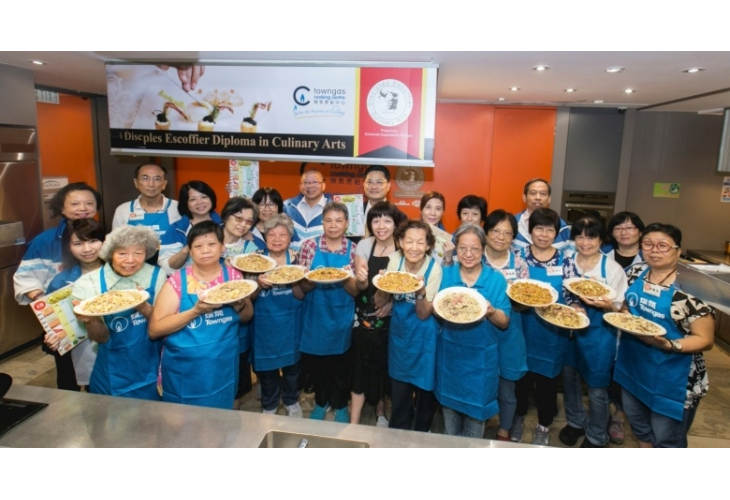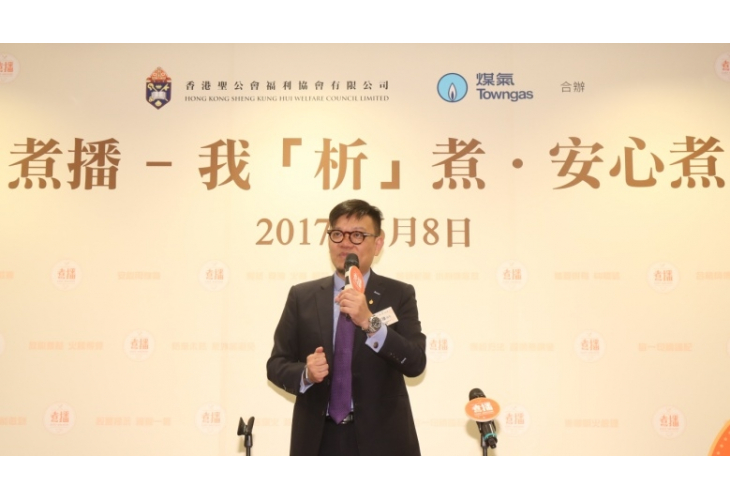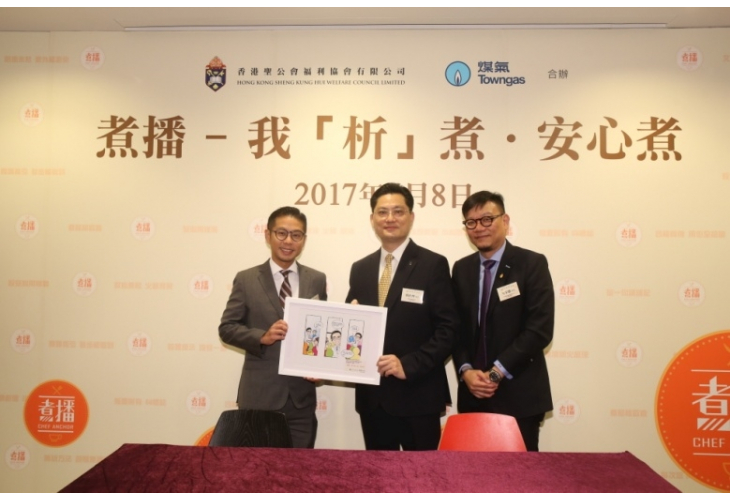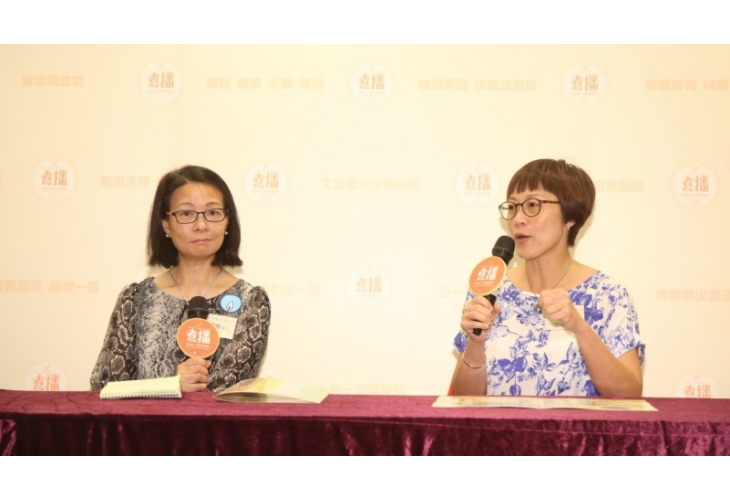A Collaborative Cooking Programme, “Chef Anchor”, Launched by the Hong Kong Sheng Kung Hui Welfare Council and Hong Kong and China Gas Company Limited Improved 90% of Participants’ Cooking Skills and Self-care Ability
In Hong Kong, approximately 9 out of 100 elderly people over 70 years old suffer from mild cognitive impairment (MCI). Ten to 15% of patients with MCI could become affected by dementia within the first year of the onset of MCI. At this moment, there is no complete cure for dementia which could affect patients physically, psychologically and socially but early intervention, appropriate treatments and aids could help delay deterioration of the disease. In light of this, the Hong Kong Sheng Kung Hui Welfare Council and Hong Kong and China Gas Company Limited (Towngas) launched the “Chef Anchor”, the first collaborative cooking programme designed by the Welfare Council’s occupational therapists and Towngas’s cooking instructors to offer training to MCI participants to alleviate their symptoms. Research results showed that 90% of MCI participants saw improvements on self-confidence, cooking skills and cognitive ability after completion of the first phase of “Chef Anchor”. On 8th June, 2017, the “Chef Anchor” sharing session was held at the Towngas Cooking Centre to brief attendees on the programme details and research results, with a view to raising the public’s knowledge about MCI while helping patients cope with daily life and fostering social interaction. A song using the melody of Towngas’s commercial theme song with new lyrics regarding cooking safety was composed. Participants were required to sing the song every session. The objective of this practice was to provide cognitive training and rebuild participants’ self-confidence in cooking.
Mr Joe Sham, Assistant Director of the Welfare Council, and Mr Issac Yeung, Towngas Head of Corporate Affairs, officiated at the sharing session, where the organiser announced the research results of the first phase of “Chef Anchor”. After completion of Phase 1, the Welfare Council surveyed 19 MCI participants and found that the procedural learning method in cooking helped improve their self-confidence, cooking skills and cognitive ability so that their abilities to follow cooking instructions could be enhanced. Most participants thought that the programme increased their confidence in cooking as well as helped them avoid mistakes, including forgetting steps and leaving the stove on. Research findings also revealed that the cognitive screening test results of about 90% of MCI participants were improved, reflecting that their cognitive ability was enhanced by the programme.
In his welcome remarks, Mr Joe Sham, Assistant Director of the Welfare Council, felt delighted to cooperate with Towngas on “Chef Anchor” cooking programme and targeted to extend the programme to cover more senior citizens with MCI. “As there are no major differences between MCI and normal ageing, MCI patients usually refuse to accept their problems and receive treatments. “Chef Anchor” combined cooking with occupational therapies, using procedural learning method in flame cooking to offer authentic cognitive training to participants. Not only did such training method increased participants’ confidence in cooking, it can also be applied to other facets of life so as to enhance participants’ overall cognitive ability and thus improve their quality of life”, he added.
At the sharing session, Mr Issac Yeung, Towngas Head of Corporate Affairs, shared, “The collaborative cooking programme—“Chef Anchor”—aims at improving MCI participants’ self-confidence and cognitive ability via cooking. Towngas would like to offer our specialty, flame cooking, to help MCI patients and create shared value. We also encouraged our staff and clients to assist participants during cooking classes in order to enrich their knowledge about the disease and to empower them to serve themselves, as well as others.”
Dr Adrian Wong, Research Assistant Professor and Clinical Psychologist at the Division of Neurology, Department of Medicine and Therapeutics at CUHK, also shared on the topic of how procedural learning method could help patients with MCI. Adrian agreed that a detailed breakdown of cooking could help train participants’ cognitive ability. Ms Charis Wong, Occupational Therapist I of the Welfare Council, and Ms Pauline Wong, Manager of Towngas Cooking Centre, illustrated the design of Chef Anchor. “Unlike other recipes, we had further broken down the steps of our task-analyzed recipes which feature colours, words and image explanations for easy understanding and safety purpose, making MCI participants enjoy the fun of flame cooking”, Pauline said. Ms Charis Wong, Occupational Therapist I of the Welfare Council, explained that MCI participants were weak at thinking and analyzing and they needed more time in receiving new messages. However, common recipes with complicated steps required users to think quickly and analyze so as to complete the tasks. Mr Chan, a 90-year-old participant, also shared his experience at the cooking programme. Chan told that he seldom cooked due to poor health while meal delivery services were arranged for him by the elderly centre. But after joining the programme, he acquired cooking skills again and regained fun and confidence in cooking. Cindy, Towngas’s volunteer, thought that she has learnt more about the life challenges of senior citizens with MCI as well as their difficulties in remember things so she would communicate with them patiently. She also gained satisfaction while working with them in the programme.
Hong Kong’s First Multi-disciplinary Procedural Learning Method in Cooking Designed for MCI Participants
“Chef Anchor” is a multi-disciplinary programme launched by the social welfare sector and business sector. In March 2017, the Welfare Council conducted a cognitive screening test for hundreds of senior citizens from its elderly centres. The senior citizens with the tendency of MCI and had difficulties in cooking were invited to join the programme. Phase one and Phase two of “Chef Anchor” have been completed so far.
“Chef Anchor” is a systematic programme featuring the following four steps to delay cognitive decline of elderly people:
- Occupational therapists and social workers of the Welfare Council designed authentic cognitive training for MCI participants, and provided cognitive screening test to them.
- Occupational therapists and social workers of the Welfare Council and Towngas cooking instructors and graphic designers worked together to tailor-make the task-analyzed recipe. This recipe featured all necessary ingredients for the dish with cooking procedures written in simple, concise and clear wordings. Safety instruction, colours, words and image explanations were also used for easy understanding and safety purpose.
- Occupational therapists and social workers of the Welfare Council would give appropriate support to MCI participants and Towngas’s volunteers.





